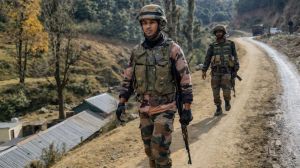White Man146;s burden
India has listened very patiently to the Grey Suits from Washington and London, Brussels and Tokyo. It has heard out the emissaries of Messr...

India has listened very patiently to the Grey Suits from Washington and London, Brussels and Tokyo. It has heard out the emissaries of Messrs Bush and Blair, as they have flown in and flown out of New Delhi like an Olympic relay team, with their diplomatic words of friendship and briefcases heavy with the White Man8217;s burden 8212; instructions, suggestions, hints, advice.
US deputy secretary of state, Richard Armitage, told us that since General Musharraf has committed himself to 8216;permanently8217; ending cross-border infiltration, it is only right that India take 8216;reciprocal de-escalatory steps8217;. Donald Rumsfeld, US secretary of defence, comes along and pours into microphones his hope that India will take steps to reduce military tension.
Since the West took on the role of being the guarantor of Musharraf8217;s promises, India reciprocated in good faith. Pakistani aircraft were now allowed to overfly India, warships were sent back to base and there has been a perceptible lowering of temperatures on the border.
But that, surely, is not the end of the script drafted this torrid summer? What about some de-escalation on the part of the West? Over the last few weeks, the Grey Suits have played the politics of the travel advisory with great panache. In tandem with stories that appeared in the western media forecasting the imminent nuclear Armageddon on the subcontinent, came those tersely worded messages from the US State Department, at first suggesting, and then insisting that American citizens 8216;8216;defer travel to India8217;8217;; at first advising and then instructing Americans currently in India to depart forthwith.
Before long, the panic had spread like a forest fire, with Britain getting into the act, followed by the governments of Australia, New Zealand, the EU, Japan, issuing their own Quit India notices. Indeed, if any initiative had an escalatory effect on prevailing tensions, it was this. What was most unfortunate was that this panic wave did not in the least reflect the ground reality in this country of continental proportions. On the contrary, it was the beeline for the airline counters that set the alarm bells ringing, as markets slumped, investor sentiment got dampened and the hitherto brisk movement of tourist traffic to and from India slowed down.
This calls for two immediate responses. The West should now seriously reconsider the relevance of their travel advisories, roll back the move and work towards establishing normalcy in the region once again.
The Indian government, on its part, must make it its business to ensure that all this does indeed happen, by not just countering the move but the propaganda that has accompanied it. And they must do this in a pro-active fashion 8212; through diplomatic channels, through commercial networks and through the media. Yes, we want a de-escalation of tensions, and we want it now.
- 01
- 02
- 03
- 04
- 05






























